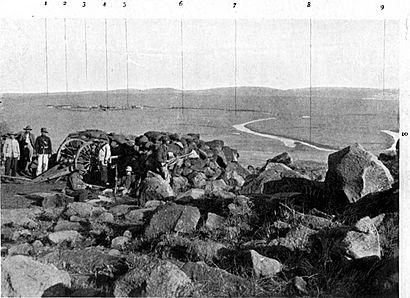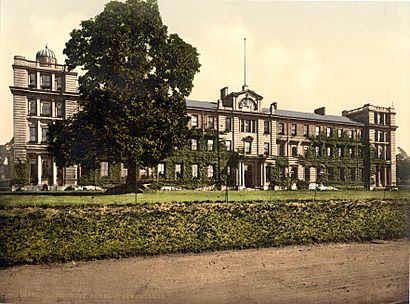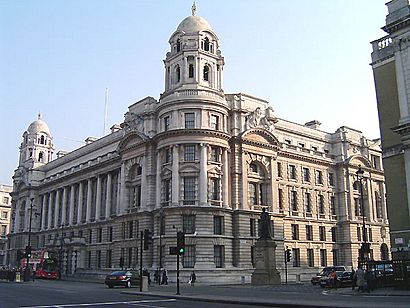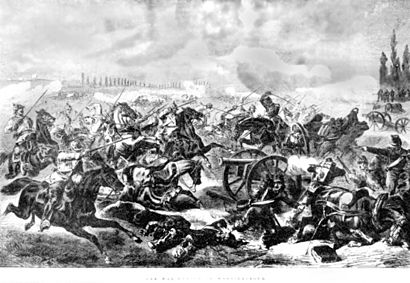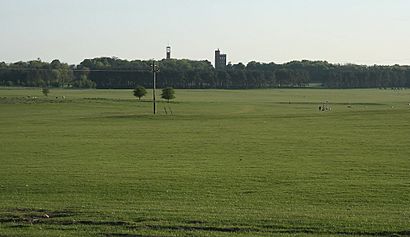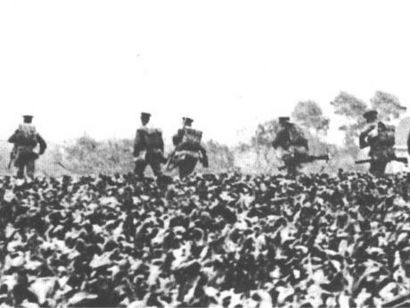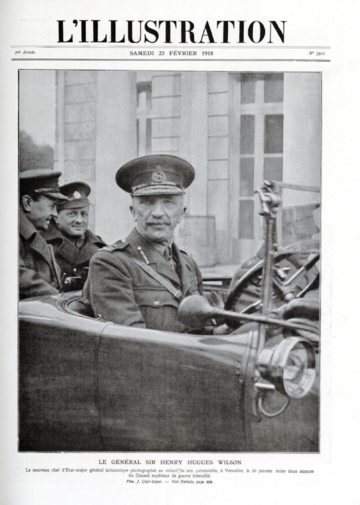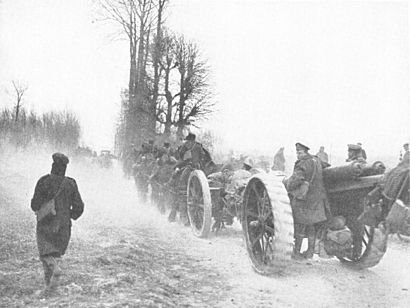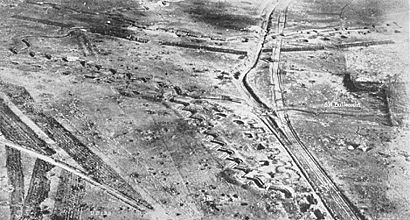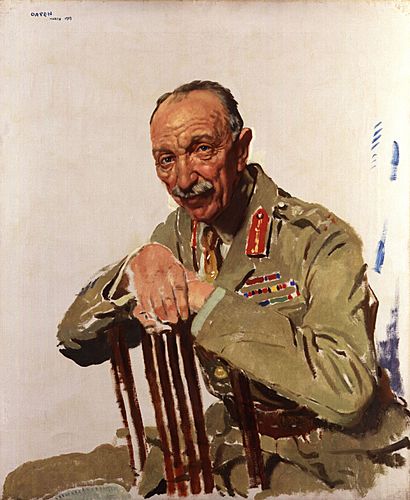Sir Henry Wilson, 1st Baronet facts for kids
Quick facts for kids
Henry Wilson
|
|
|---|---|
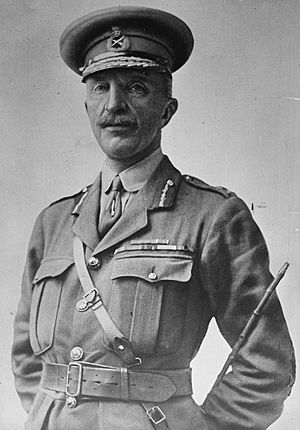
Field Marshal Sir Henry Wilson, 1st Baronet
|
|
| Birth name | Henry Hughes Wilson |
| Born | 5 May 1864 Ballinalee, County Longford, Ireland |
| Died | 22 June 1922 (aged 58) London, England |
| Allegiance | United Kingdom |
| Service/ |
British Army |
| Years of service | 1882–1922 |
| Rank | Field Marshal |
| Commands held | Chief of the Imperial General Staff Eastern Command IV Corps Staff College, Camberley 9th Provisional Battalion, Rifle Brigade |
| Battles/wars | Third Anglo-Burmese War Second Boer War First World War |
| Awards | Knight Grand Cross of the Order of the Bath Distinguished Service Order Mentioned in Despatches Légion d'honneur (France) Order of Leopold (Belgium) Croix de guerre (Belgium) Order of Chia-Ha (China) Distinguished Service Medal (United States) Order of the White Elephant (Siam) Order of the Rising Sun (Japan) Order of the Redeemer (Greece) |
| Member of Parliament for North Down |
|
| In office 21 February 1922 – 22 June 1922 |
|
| Preceded by | Thomas Watters Brown |
| Succeeded by | John Simms |
Field Marshal Sir Henry Hughes Wilson, 1st Baronet (5 May 1864 – 22 June 1922) was a very important British Army officer during the First World War. He also became an Irish unionist politician for a short time.
Wilson was the leader of the Staff College, Camberley, and then worked at the War Office. There, he helped create plans to send British troops to France if a war started. He was known for his political involvement, especially for supporting conscription (making military service compulsory) and during the Curragh incident in 1914. In this event, he encouraged officers to resign rather than fight against Irish volunteers.
During World War I, Wilson was a key advisor to the British Expeditionary Force (BEF). Later, he became an advisor to Prime Minister David Lloyd George and a British representative at the Supreme War Council. In 1918, he became the professional head of the British Army, a role he continued after the war.
After leaving the army, Wilson was a Member of Parliament and an advisor to the Northern Ireland government. He was sadly killed by two IRA gunmen in 1922.
Contents
Early Life and Military Training
Where Did Henry Wilson Grow Up?
Henry Wilson was born in Ballinalee, County Longford, Ireland, in 1864. His family were Ulster Protestants and owned land. They were considered fair landlords.
Henry was one of four sons and had three sisters. He went to Marlborough College, a public school, from 1877 to 1880. He spoke with an Irish accent and saw himself as British, Irish, or an Ulsterman at different times.
How Did He Join the Army?
Henry tried several times to get into officer training schools, but it was very competitive. In 1882, he joined the Longford Militia, which was a local military force. This allowed him to later apply for a regular commission.
After studying French and German, he passed the Army exam in 1884. He first joined the Royal Irish Regiment but soon moved to the more famous Rifle Brigade.
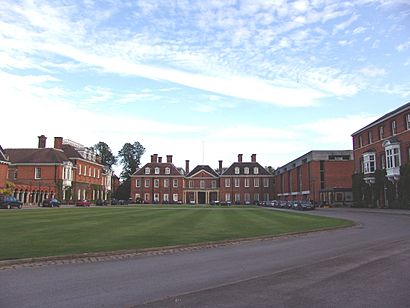
His First Battles and Injuries
In 1885, Wilson was sent to India. He enjoyed polo and hunting. In 1886, he went to Burma to fight in the Third Anglo-Burmese War. This war involved fighting against local rebels.
He was wounded above his left eye in 1887. The injury left him disfigured and earned him nicknames like "Ugly Wilson." He spent a year recovering in Ireland.
Henry Wilson's Marriage
While recovering in Ireland, Wilson met Cecil Mary Wray, who was two years older than him. Her family had faced hard times, and her views on Irish politics were very strong. They got married on 3 October 1891.
Henry and Cecil did not have children. They loved their pets and other people's children, often taking in young relatives.
Learning at Staff College
In 1888, Wilson began studying for the Staff College, Camberley. This was a school for training army officers to become staff officers. It was a good way to get promoted.
He passed the entrance exam in 1891, showing he was very smart. At Staff College, he learned about military history and strategy. He even visited battlefields from the Franco-Prussian War. He became good friends with Henry Rawlinson and was mentored by Lord Roberts.
Working at the War Office
After graduating in 1893, Wilson was promoted to captain. He managed to get a job at the War Office in London in 1894. He worked in the Intelligence Division, which gathered information about other countries' militaries.
He became the youngest staff officer in the British Army. His work involved studying military plans for countries like France and Belgium.
Fighting in the Boer War
Tensions Before the War
In 1896, Wilson believed war with the Transvaal (a Boer republic in South Africa) was likely. He helped plan how to invade the Boer republics. He wanted 40,000 troops to be sent, much more than others suggested.
The Second Boer War began on 11 October 1899. Wilson was appointed a brigade major and arrived in South Africa in November.
Battles in Natal
Wilson's brigade fought in the Battle of Colenso in December 1899. British troops faced strong resistance from hidden Boer soldiers. This battle was one of three defeats for the British in what was called "Black Week."
Wilson was critical of the British commander, Redvers Buller, for being too slow and not sharing information. He believed Buller's delays cost them opportunities. He also criticized other generals for poor tactics.
After more battles, the British finally relieved the besieged town of Ladysmith in February 1900. Wilson met his friend Rawlinson, who had been trapped there.
Working for Lord Roberts
In August 1900, Wilson joined Lord Roberts' staff. He was promoted and returned home with Roberts in December. This job allowed him to connect with important political figures.
After the Boer War
Working at the War Office Again
In 1901, Wilson helped organize awards for soldiers from the South African War. He received a Distinguished Service Order for his own service.
He also wrote articles about army reform, arguing that Britain needed a larger army for overseas service. He even suggested conscription (compulsory military service), which was a controversial idea.
Improving Military Training
Wilson returned to the War Office in 1903 to work on military education and training. He helped create manuals that would be used when the army went to war in 1914.
He became friendly with politicians like Arthur Balfour and Winston Churchill. He also secretly shared information with them about army reforms.
Creating the General Staff
Wilson strongly pushed for the creation of a General Staff, a central body to plan military strategy. He believed it was essential for the army's future.
In 1906, a General Staff was finally set up. Wilson had played a key role in making this happen.
Leading the Staff College
Becoming Commandant
In 1907, Wilson became the Commandant of the Staff College, Camberley. This was a very important position. He was promoted quickly, going from captain to brigadier general in just over five years.
He was very close to Lord Roberts, who helped him get the job. Wilson's pay increased, allowing him to buy polo ponies and a second car.
His Teaching Style
Wilson believed in a "School of Thought" for staff officers, emphasizing administrative knowledge, physical fitness, and good judgment. He was known for his engaging lectures.
He had his students plan how to deploy an Expeditionary Force to France, even assuming a German invasion of Belgium. He also met with French military leaders like Ferdinand Foch, building strong relationships.
Wilson supported conscription, believing Britain needed a larger, better-trained army. He helped expand the Staff College to train more officers.
Director of Military Operations
Planning for War with France
In 1910, Wilson became the Director of Military Operations (DMO) at the War Office. His main job was to create detailed plans for sending British troops to France if war broke out. He believed the existing plans were "disgraceful."
He worked closely with French military leaders, especially Ferdinand Foch. They discussed how British forces could help France in a war against Germany.
The Agadir Crisis
In 1911, a crisis in Agadir, Morocco, almost led to war between Germany and France. Wilson pushed for Britain to support France strongly. He argued that Britain must send its entire Expeditionary Force to France immediately.
He believed that British help was essential to prevent Germany from dominating Europe. He even thought that the small number of British divisions could have a big impact.
Preparing for Conflict
Wilson continued to refine war plans, including railway timetables for troop movement. He also worked on cooperation between the Army and Navy.
He believed that the presence of British forces on the continent would be crucial in any future war. He was also appointed Honorary Colonel of the 3rd Battalion, Royal Irish Rifles.
The Curragh Incident
Wilson's Political Views
Wilson and his family were strong supporters of Unionist politics. They opposed Home Rule, which would give Ireland its own government.
In 1913, Wilson learned about plans to raise armed men in Ulster to resist Home Rule. He said he would fight for Ulster if needed. He also secretly shared information with Conservative politicians who opposed Home Rule.
The Crisis at Curragh Camp
In March 1914, the British government considered using troops to move against the Ulster Volunteers (UVF), who were armed and ready to resist Home Rule. Many officers, especially those with Irish connections, were deeply troubled.
Wilson advised officers, including Hubert Gough, not to resign immediately but to stand firm. He believed the army should not be used to force Home Rule on Ulster. He was present when Gough demanded a written guarantee that the army would not be used against Ulster.
When the government publicly went back on this guarantee, many senior officers, including Sir John French, resigned. Wilson felt the army had successfully prevented the coercion of Ulster.
World War I Service
The Start of the War
In July 1914, Wilson was worried about civil war in Ireland. But by the end of July, it was clear that a major war was about to begin in Europe. Britain declared war on Germany on 4 August.
Wilson helped plan the deployment of the British Expeditionary Force (BEF) to France. There was debate about where to send the troops, but it was decided to send five divisions to Maubeuge, France.
Chief of Staff in France
Wilson was appointed "Sub Chief of Staff" for the BEF. He worked closely with the French military. He was critical of Lord Kitchener for delaying troop movements and for his "colossal ignorance."
Wilson, Sir John French, and Archibald Murray arrived in France on 14 August. Wilson initially underestimated the size of the German forces. During the Battle of Mons in August, British troops were forced to retreat. Wilson believed that if the BEF had had more divisions, a retreat might not have been necessary.
The Great Retreat
The BEF staff struggled during the retreat. Wilson was one of the calmer officers. He opposed Horace Smith-Dorrien's decision to stand and fight at Le Cateau, but wished him luck when Smith-Dorrien said he had no choice.
Wilson played a key role in communicating with the French. He helped persuade Sir John French to join in the First Battle of the Marne, which was a major Allied victory. After this victory, Wilson believed the war was almost won.
Liaison with the French
In January 1915, Wilson became the Principal Liaison Officer with the French Army. He worked closely with French generals like Ferdinand Foch, often helping to smooth over tense meetings between the British and French.
He opposed the Gallipoli Campaign, believing it was a waste of resources that should be used on the Western Front. He was knighted in June 1915 for his services.
Commanding a Corps
In December 1915, Wilson was given command of IV Corps, a large unit of nearly 70,000 men. He focused on training his troops. He also maintained his political connections in London.
During the Easter Rising in Ireland in April 1916, Wilson hoped it would lead to the fall of the British government. He was against the idea of Home Rule for Ireland.
His corps was involved in a surprise German attack in May 1916. Wilson did his best to organize a counterattack, but it failed. He was nearly removed from command, but was saved by a positive report from his superior.
Advisor to the Prime Minister
In January 1917, Wilson accompanied Prime Minister Lloyd George to a conference in Rome. He was then sent on a mission to Russia to boost morale and coordinate attacks. He met the Tsar and other Russian officials, but noted the widespread talk of revolution.
After his return, Wilson became the Chief of British Mission to the French Army. He was promoted to permanent lieutenant-general. He worked closely with French Commander-in-Chief Robert Nivelle.
When Nivelle's offensive failed, Wilson's role became less clear. He considered entering politics, as he was unhappy with the military leadership. However, he was offered command of Eastern Command in London, which allowed him to work closely with Prime Minister Lloyd George.
Supreme War Council
In November 1917, Wilson became the British Military Representative on the Supreme War Council (SWC). This council was set up to coordinate Allied military strategy. Wilson played a key role in its formation.
He worked on plans for coordinated defense and reserves across the Western Front. He also advised on operations against Turkey and Bulgaria. In December 1917, he was given the temporary rank of general.
Chief of the Imperial General Staff (1918)
On 19 February 1918, Wilson was appointed Chief of the Imperial General Staff (CIGS), the highest professional military position in Britain. He became the main military advisor to Lloyd George during the final year of World War I.
One of his first actions was to significantly increase the size of the Tank Corps. He also pushed for changes in senior general positions.
German Spring Offensive
The German "Michael" Offensive began on 21 March 1918. Wilson initially thought it might be a smaller attack. However, the Germans made rapid gains.
Wilson worked to get more British troops sent to France. He also played a key role at the Doullens conference, where Ferdinand Foch was appointed Allied generalissimo (overall commander).
Wilson strongly supported extending conscription to Ireland, believing it would provide more soldiers. This was a very controversial idea in Ireland.
Allied Victory
Wilson continued to advise on strategy as the Allies pushed back the German forces. He was appointed a Knight Grand Cross of the Order of the Bath (GCB) in December 1918, a high honor.
After the War
Reducing the Army Size
After the war, Wilson faced the challenge of demobilizing (sending home) millions of soldiers. There were riots as soldiers wanted to return home quickly. Wilson blamed politicians for promising too much.
The army's size was greatly reduced. Wilson supported the "Ten Year Rule," which assumed Britain would not be involved in a major war for ten years, guiding defense spending.
Peace Treaty Discussions
Wilson spent months at the Paris Peace Conference as Britain's chief military advisor. He advised against harsh financial terms for Germany, fearing it could lead to future problems.
He also pushed for a strong alliance between Britain and France. In June 1919, he was promoted to field marshal, the highest rank in the British Army. He was the youngest non-royal field marshal since Wellington.
Dealing with Unrest
Wilson was concerned about labor unrest in Britain, with strikes by police and railway workers. He drew up plans to use troops to protect London.
He also worried about commitments in places like Mesopotamia (modern Iraq) and Palestine, believing Britain was overstretched. He thought Britain should focus its troops in key areas like Britain, Ireland, India, and Egypt.
Ireland's Struggle for Independence
Wilson believed that "a little bloodletting" was needed in Ireland to deal with the growing unrest. He was concerned about the violence and the discipline of British forces.
He pushed for martial law (military rule) in Ireland, especially after the "Bloody Sunday" assassinations in November 1920. He wanted a strong military campaign to restore order.
The Irish War of Independence intensified in 1921. Wilson wanted to send more troops to crush the rebels. However, the British government began secret talks, leading to the Truce of 11 July 1921.
Wilson called the Truce "rank, filthy cowardice." He believed the Irish Treaty (December 1921) was a "shameful surrender." His relationship with Lloyd George broke down over this issue.
Member of Parliament and Advisor
After retiring from the army in February 1922, Wilson was elected as a Member of Parliament for North Down in Northern Ireland. He used his position to oppose the government.
Sir James Craig, the Prime Minister of Northern Ireland, asked Wilson to advise on security. Wilson recommended increasing the police force and encouraging Catholics to join, but this was not fully adopted. He was blamed by some Irish nationalists for the police's actions during sectarian violence.
Assassination
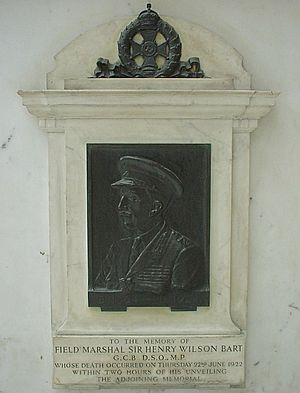
On 22 June 1922, two members of the Irish Republican Army, Reginald Dunne and Joseph O'Sullivan, shot and killed Henry Wilson outside his home in London. He was in full military uniform, returning from unveiling a war memorial.
The two men were captured after a struggle with police and a crowd. They were later found guilty of murder and executed.
Wilson had always considered himself Irish. His family home in Ireland was burned down on the day his killers were executed. Dunne stated that Wilson was killed because he was a military advisor to the Ulster Government and had organized the Ulster Special Constabulary, which Dunne blamed for a "reign of terror."
Some historians suggest that Michael Collins, the Irish Free State General, ordered the assassination. However, this claim is debated by others.
Wilson's death caused shock in the UK. His funeral was a large public event, attended by many important figures, including Lloyd George and French military leaders. He was buried in St Paul's Cathedral.
How People Remembered Him
His Personality
Many people found Wilson charming and witty. He was known for his ability to talk to politicians easily. Some British officers, however, thought his sympathy for the French was too strong.
He had a difficult relationship with Douglas Haig, the British commander in France. Haig thought Wilson was a "politician, and not a soldier."
His Legacy
Early biographies of Wilson sometimes showed him as an ambitious intriguer. However, later historians have argued that he was a skilled advisor who understood the importance of working with politicians.
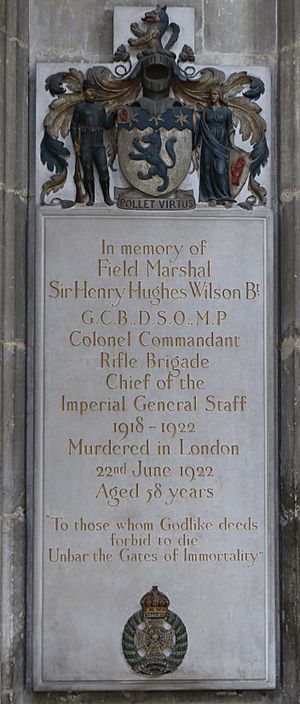
Wilson's foresight in planning for war with France before 1914 was seen as crucial. He ensured Britain was ready to fight alongside France.
His assassination was a tragic event that highlighted the deep divisions in Ireland at the time.
 | Toni Morrison |
 | Barack Obama |
 | Martin Luther King Jr. |
 | Ralph Bunche |


